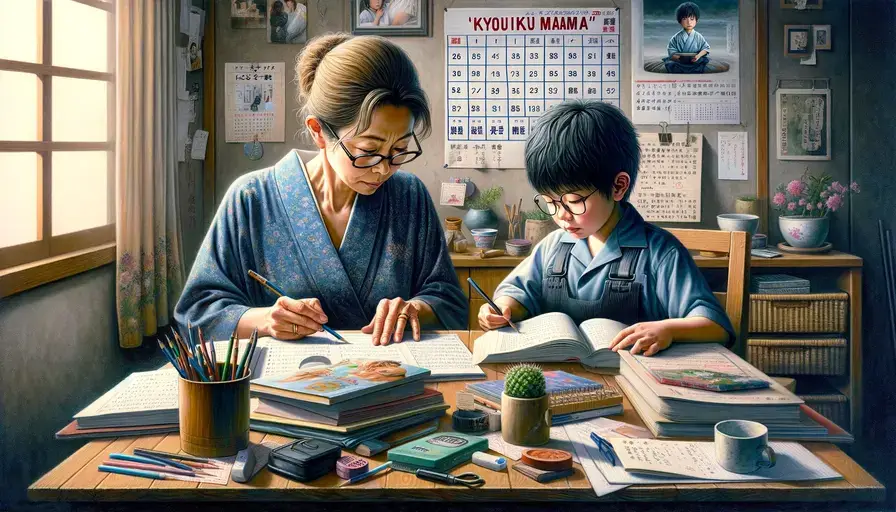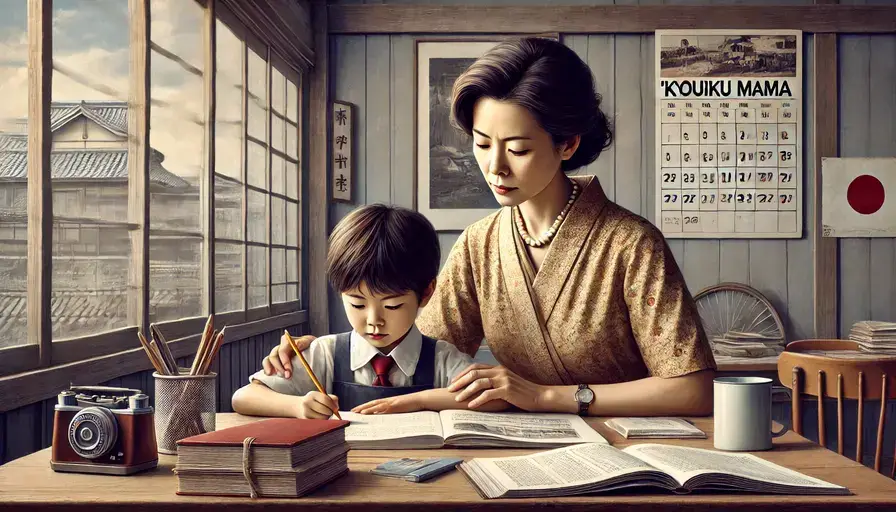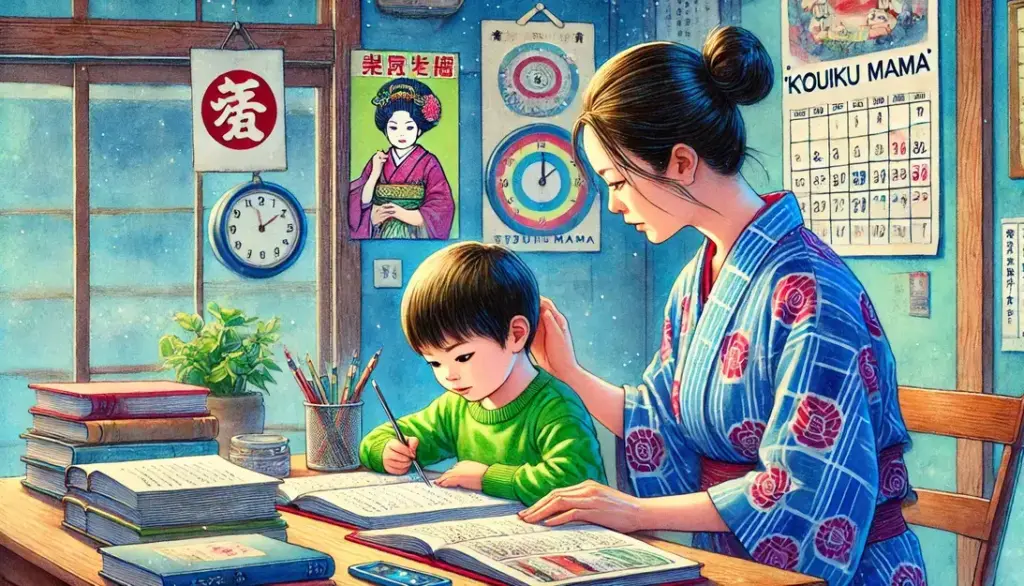In Japan, the term “Kyouiku Mama” describes mothers who obsessively focus on their children’s academic success. These mothers often push their kids to excel in school, attend cram classes, and prep for competitive exams starting at an early age. While some see it as dedication, others critique it for adding stress to children. This concept is tied to Japan’s competitive education system and the cultural value placed on hard work and success. For many, it reflects the intense pressure of navigating a society where academic achievements can shape one’s future.
What is Kyouiku Mama?
Mothers in Japan have a special role in their children’s educational journey, and the term “Kyouiku Mama” captures this dedication. It isn’t just a label; it’s a social phenomenon deeply tied to Japan’s values around success and hard work. The term stands at the intersection of cultural expectations and family devotion, encapsulating the intense drive some mothers have to guide their children toward academic excellence.

Literal Meaning and Cultural Context
The term “Kyouiku Mama” (教育ママ) translates directly to “Education Mama.” In Japanese culture, it refers to a mother devoted to ensuring her child’s academic success, often at the expense of her own interests. This concept is not just about tutoring or enrolling children in after-school programs—it’s a lifestyle. These mothers often manage rigorous daily schedules, juggling school homework, extracurricular activities, and cram schools (known as “juku”). Their efforts reflect the belief that a solid education is the gateway to a brighter future.
Culturally, Japan places immense value on education, with academic achievements often linked to status and opportunities. “Kyouiku Mama” embodies this mindset, mirroring the societal pressure many families feel to succeed in a competitive educational environment. Celebrated for their dedication, but sometimes criticized for being overly controlling, these mothers are both admired and debated in modern Japanese society.

Historical Background
The roots of Kyouiku Mama can be traced back to Japan’s post-war years and the “good wife, wise mother” (良妻賢母) ideology. This concept defined the ideal role of women—to support their families with devotion and nurture children into capable adults. Post-World War II societal shifts, driven by the need to rebuild the country, placed a new emphasis on education as a tool for individual and national growth.
During this period, economic reforms and modern schooling opportunities created an environment where mothers took on a pivotal role in shaping their children’s academic journey. The rise of middle-class values and expectations further fueled this responsibility, turning education into a family mission. Over time, the mother became the key figure orchestrating the child’s success, a responsibility both empowering and burdensome.
You’ll find detailed insights about this era in this exploration of Kyouiku Mama’s historical roots.
Modern-Day Perception
Today, the term “Kyouiku Mama” evokes mixed feelings in Japan. On one hand, these mothers are admired for their dedication and unwavering commitment to their children’s future. Many families depend on this intense involvement to navigate Japan’s highly competitive education system. On the other hand, the term carries negative connotations for some, highlighting the stress and pressure placed on children and the sacrifices made by mothers.
Many modern Japanese families face criticism for fostering a culture of overachievement, leading to concerns about youth mental health. Some argue it’s a form of “helicopter parenting,” while others see it as a cultural expression of love and responsibility. Regardless, the Kyouiku Mama symbolizes the delicate balance between support and control in a society deeply rooted in academic success.
To understand the shifting perspectives, explore more about how Kyouiku Mama is perceived today.
The Role of a Kyouiku Mama
In Japanese culture, the term “Kyouiku Mama” refers to mothers who dedicate themselves to their child’s educational success. This role encompasses much more than overseeing homework; it’s a lifestyle that requires a blend of dedication, resources, and emotional investment. Let’s explore how these mothers shape the educational journey of their children.
Focus on Academic Excellence

Photo by Annushka Ahuja
Kyouiku Mamas put academic success at the forefront of their priorities, often making it a family mission. Their constant involvement doesn’t stop at regular schooling. Many opt to enroll their children in after-school cram schools known as “juku,” where specialized tutoring sharpens their skills for competitive exams.
These mothers often work closely with teachers and stay updated on their child’s performance, ensuring no academic detail goes unnoticed. They help the child prepare rigorously for entrance exams, which are pivotal in determining access to top-tier schools and universities.
For a deeper look into the significance of cram schools, check out Inside the Cramschool Pressure Cooker: The Juku System.
Financial Investments in Education
The financial commitment attached to this parenting style is substantial. From private tutors to purchasing supplementary textbooks filled with complex practice problems, Kyouiku Mamas are prepared to invest heavily in their child’s future. Education often becomes the single largest household expense for families embracing this lifestyle.
These mothers may spend thousands of dollars annually on tuition for juku, test prep courses, and even specialized enrichment programs. Many take securing quality education as seriously as purchasing property or investing in a business.
Educational expenses in the Japanese system, including private tutoring, are detailed further in “Kyoiku Mamas.”
Time and Emotional Dedication
Apart from financial resources, being a Kyouiku Mama requires considerable emotional and time investments. These mothers give up personal leisure to sit with their children during homework sessions, offer motivational talks, and even participate in school activities such as PTA meetings to ensure active involvement.
For these women, every minute is an opportunity to support their children, turning their full-time job into education facilitation. Whether it’s prepping their kindergarten child for reading comprehension or guiding a teenager through calculus problems, their dedication is unrelenting.
If you want to learn more about the time demands on mothers in Japan, see this in-depth perspective from Kyoiku Mama: Educating Offspring Is Full-Time Job.
In the next sections, we’ll explore how this intense focus influences not only family dynamics but also societal perceptions of motherhood in Japan.
Impact on Children
The role of a “Kyouiku Mama” brings both rewards and challenges to the lives of children. While academic successes often follow this parenting model, the accompanying pressure can interfere with emotional health and social development. Let’s break down these effects.
Academic Achievements
Kyouiku Mamas are known to push their children toward remarkable academic success. Their constant involvement ensures that kids perform well not only in school but also in highly competitive entrance exams. This focus often helps children gain access to prestigious schools and universities, setting the stage for future opportunities.
Children from such households are likely to develop disciplined study habits and a high level of competency in essential subjects like mathematics and science. Frequent exposure to extra-curricular academic resources, such as cram schools (juku), widens their educational horizons, giving them an edge over peers.
However, while the dedication of Kyouiku Mamas results in academic excellence, it is often achieved at a cost. As this article from Education Week notes, the relentless drive for achievement can overshadow other aspects of childhood.
Mental and Emotional Health
Under constant pressure to perform, children’s emotional well-being often takes a hit. The intense expectations from their mothers can lead to elevated levels of stress and anxiety. For some, the fear of failing to meet these standards becomes overwhelming, affecting self-esteem and mental health.
Studies show that a harsh, high-pressure parenting style—characteristic of the Kyouiku Mama approach—can contribute to emotional regulation problems in children, as highlighted in research on parenting dynamics.
This emotional strain often manifests in physical health problems, such as fatigue or insomnia, and mental health challenges like burnout. It’s important to note that while some children thrive under pressure, others may feel stifled, resulting in long-term effects on their self-worth.
Social Development Challenges
The heavy emphasis on academics can create significant gaps in a child’s social and emotional development. With much of their time devoted to studying, these children may struggle to form and sustain friendships or even cope with social settings at school.
Children under such parenting styles might miss out on opportunities to engage in play, sports, or creative activities—all of which are integral to developing social skills. This imbalance can lead to feelings of isolation and difficulty adapting to group dynamics later in life.
Research into child social development in Japan suggests that limited exposure to social interactions in early years may hinder interpersonal skills. Over time, this lack of balance could impair their ability to collaborate and connect with others, both personally and professionally.
In summary, while a Kyouiku Mama’s influence can pave the way for academic success, it often comes at the expense of emotional health and social capabilities, creating a complex legacy for the child.


